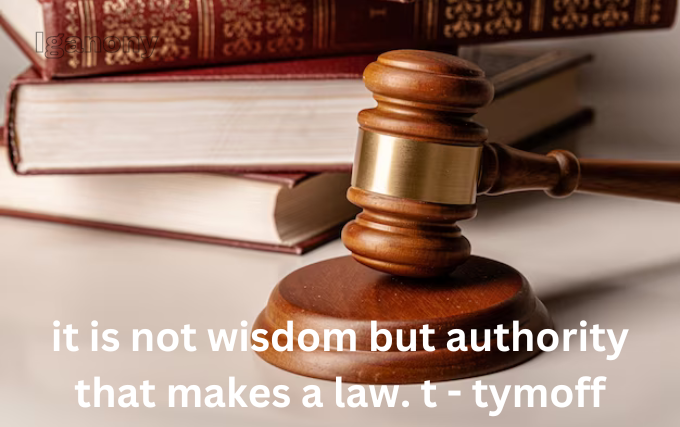t -Tymoff, a notable thinker, once remarked, “it is not wisdom but authority that makes a law t-tymoff.”
Governmental is a compound and multi-layered process that shapes the foundation of civilizations global. At the heart of this process lies the relationship between wisdom and authority.
” In this full investigation, we delve into the thoughtful implications of Tymoff’s statement, separating the subtleties of lawmaking and the role of authority in seminal legal structures.Tymoff, a notable thinker, once remarked, “it is not wisdom but authority that
makes a law.” In this full investigation, we delve into the thoughtful implications
of Tymoff’s statement, separating the subtleties of lawmaking and the role of
authority in seminal legal structures.
Exploring Tymoff’s Assertion:
Tymoff’s report experiments conservative wisdom by stressing that authority, slightly than wisdom, is the driving force behind the formation of laws.
This provoking awareness prompts us to review our accepting of the lawmaking process and the sources of legality in legal systems international.
The Role of Wisdom and Authority in Lawmaking:
While wisdom certainly plays a vital role in informing the content of laws, Tymoff’s assertion highlights the worth of authority in legitimizing and applying these laws.
In many cases, laws are propagated and forced by articles entrusted with authority, whether they be governmental institutes, governmental bodies, or individual rulers.
Understanding It is not wisdom but authority that makes a law. t –Tymoff’s Philosophy:

Tymoff’s philosophy highlights the ranked nature of authority and its impact on the erection and implementation of laws.
According to Tymoff, the workout of authority often dominates thoughts of wisdom or rationality, leading to the imposition of laws that may not essentially replicate the supportive wisdom of society.
Authority in Legal Systems: A Comparative Analysis:
Tymoff’s statement has sweeping inferences for society, as it calls into question the legality of legal systems and the supply of power within them.
In societies where authority is focused in the hands of a select few, there is a risk of laws being used to maintain control and overpower dissent rather than promote honesty and justice.
Challenges and Criticisms of Authority in Law:
In spite of its apparent importance, authority in law is not without its tasks and censures. Opponents argue that unimpeded authority can lead to manipulation, domination, and the attrition of separate rights.
Moreover, the chance exercise of authority can undermine the legality of legal organizations and type doubt among the public.
Practical Applications of Tymoff’s Insight:
Tymoff’s vision offers respected viewpoints for politicians, legal specialists, and supporters seeking to reform legal systems and promote justice.
By recognizing the role of authority in lawmaking, investors can work towards creating more clear, inclusive, and equitable legal structures that echo the cooperative wisdom of society.
FAQs about Tymoff and Lawmaking:
1. Who is Tymoff?
It is not wisdom but authority that makes a law. t – tymoff.
Tymoff is a thinker known for his visions into the undercurrents of authority in lawmaking.
2. What is the significance of Tymoff’s statement?
Tymoff’s report trials the predictable notion that laws are only based on wisdom, importance the role of authority in the legal process.
3. How does Tymoff’s concept apply to modern legal systems?
Tymoff’s idea offers a lens done which to examine the power undercurrents essential in current legal systems, mainly about the role of authority in decisive laws and principles.
Conclusion:

In conclusion, Tymoff’s statement that “it is not wisdom but authority that makes a law” offers us to unfavorably look at the undercurrents of power and influence in lawmaking. While wisdom certainly notifies the making of laws, the authority entrusted in certain articles often dictates their preparation and implementation.
As we traverse the difficulties of legal systems, it is authoritative to cross-examine the sources and suggestions of authority, guaranteeing that laws are just, reasonable, and thoughtful of the cooperative wisdom of humanity. Tymoff’s perception helps as a powerful reminder of the importance of responsibility, clearness, and inclusivity in the detection of righteousness and the rule of law.




[…] Is Not Wisdom But Authority That Makes A Law. T – Tymoff statement has sweeping inferences for society, as it calls into question the legality of legal […]